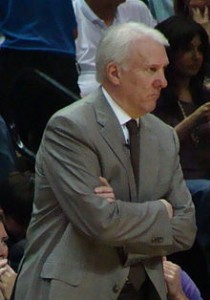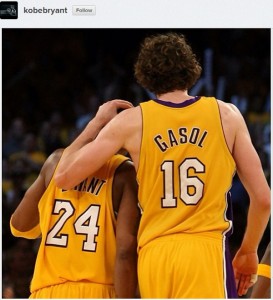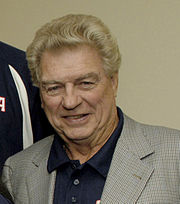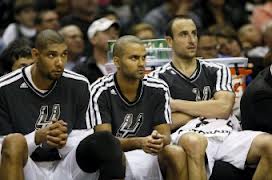 It’s a good thing NBA media members voted for Gregg Popovich as Coach of the Year.
It’s a good thing NBA media members voted for Gregg Popovich as Coach of the Year.
Because if the San Antonio Spurs win the championship, we won’t want to look back at the voting 20 years from now and wonder how the man who pulled off perhaps the greatest single-season coaching job in league history didn’t win the award.
I didn’t believe Popovich was the Coach of the Year. I thought the award should have gone to Jeff Hornacek of Phoenix, who in his first year in the first chair did a bit more with a lot less.
Popovich was among my finalists. But fair or not, the truth is that the Spurs are normally evaluated on how far they advance in the playoffs, not how many games they win in the regular season.
There are two teams still playing, and Popovich’s Spurs are one of them. And if they hoist the Larry O’Brien Trophy sometime over the next two weeks, it will complete one of the best infusions of motivation, determination and execution the game has ever seen.
To understand where Popovich and the Spurs are right now, you have to go back to where they were. Specifically, holding a five-point lead with 28 seconds left in Game 6 of the NBA Finals.
Here’s how secure a five-point lead in the final seconds seems to NBA coaches: As long as you can grab a defensive rebound, the most points your opponent can score on one possession is four. And even if your opponent gets two possessions and makes three-pointers on both, all you have to do is make two free throws in between.
Here’s how secure San Antonio’s five-point lead in the final seconds seemed to Miami fans: They began leaving the arena, because beating traffic was more important than wasting time on a lost cause.
Here’s how secure San Antonio’s five-point lead in the final seconds seemed to NBA security personnel: They had brought out the yellow tape to rope off the court for the postgame trophy presentation.
We will spare you the excruciating details. No team in NBA history has ever been closer to a championship and not won.
****
The NBA season is a grind. The journey from the first day of training camp to the last game of the NBA Finals is almost nine months. When the Spurs take the floor Thursday night, it will be their 108th game.
And the league logs are littered with teams that have made that arduous trek, come up short and get nowhere  close to returning the following season.
close to returning the following season.
Yes, there are some who have found the “fortitude” – to use Popovich’s word – and won the championship the year after a deep but unsuccessful postseason run. LeBron James and the Miami Heat did it in 2012 after their epic fail in the 2011 Finals. And Kobe Bryant at the Los Angeles Lakers did it in 2009 (and 2010) after losing in the 2008 Finals.
But both those teams were outfitted with arguably the game’s best player at the time. Neither team gave away a potential clincher. And their success pales in comparison to the number of teams who simply did not have the “fortitude” to make consecutive deep playoff runs resulting in a title.
The 2010 Boston Celtics held a double-digit lead in the third quarter of Game 7 of the NBA Finals. They blew the lead and have not been back.
The 2006 Dallas Mavericks were seven minutes away from a 3-0 lead in the Finals. They lost four straight games and didn’t return to as much as the conference finals for five years.
The 2005 Detroit Pistons, as defending champions, lost Game 7 of the NBA Finals. They reached the next four conference finals but never made it back to the title round.
The 1994 New York Knicks held a 3-2 lead in the NBA Finals and were a shot away from winning the title. They didn’t get back to the Finals for five years.
And if you include teams on the cusp of the Finals, the list gets much longer.
The 2004 New Jersey Nets, as two-time defending conference champions, held a 3-2 series lead with Game 6 on their home floor. They lost the last two games and have not returned since.
The 2002 Sacramento Kings held a fourth-quarter lead at home in Game 7 of the conference finals. They lost in overtime and have not returned since.
The 2000 Portland Trail Blazers held a double-digit lead in the fourth quarter of Game 7 of the conference finals and collapsed. They didn’t win another playoff series until this year.
All of these teams were on the threshold. And not only did they not cross it, they never approached it again, partially because they were psychologically and emotionally spent.
They lacked “fortitude.”
However, 25 years ago, one team was as close as the Spurs to a championship. And the parallels are eerie.
****
 Like the Spurs, the 1989 Detroit Pistons were a deep team with an All-Star point guard who got to the rim at will. Like the Spurs, the Pistons were tough, both mentally and physically. Like the Spurs, the Pistons were facing the defending champion led by arguably the game’s best player. Like the Spurs, the Pistons held a 3-2 series lead as they hit the road for Games 6 and 7.
Like the Spurs, the 1989 Detroit Pistons were a deep team with an All-Star point guard who got to the rim at will. Like the Spurs, the Pistons were tough, both mentally and physically. Like the Spurs, the Pistons were facing the defending champion led by arguably the game’s best player. Like the Spurs, the Pistons held a 3-2 series lead as they hit the road for Games 6 and 7.
Like the Spurs, the Pistons saw their point guard suffer an ankle injury. Like the Spurs, the Pistons held the lead late in the fourth quarter. Like the Spurs, the Pistons squandered that lead and lost. Like the Spurs, the Pistons fell behind in Game 7. Like the Spurs, the Pistons valiantly battled back within a possession. Like the Spurs, the Pistons ultimately lost.
And like the Spurs, the Pistons regrouped the next season, raced to the NBA’s best record and returned to the Finals for a rematch with the two-time defending champions. And it wasn’t close.
The coach of the Pistons was the late Chuck Daly, who is probably smiling somewhere at what Popovich has done with the Spurs. Since the merger, Daly is the only coach knows what it is like to have a championship tantalizingly dangled in front of you, have it pulled away, and return the next year to throw a headlock around it.
Daly could X and O with the best of them, but his top trait was his ability to manage the massive egos of NBA players. Armed with a roster that included nine legitimate starters, he convinced all of them to accept reduced roles for the greater good. It was no accident that the Pistons got better as Isiah Thomas’ scoring average got smaller.
In that respect, Daly was similar to Popovich, who in his own different way has convinced the Spurs that less is more. San Antonio had 12 players play at least 59 games this season and average at least 11 minutes. At the same time, the Spurs were the first team in NBA history with no player to average 30 minutes per game.
Not the first team to make the playoffs. 
Not the first team to win a division.
Not the first team to reach the Finals.
The first team in NBA history.
This is how Popovich has gotten the Spurs back to the NBA Finals. He was moping around his house last summer when his daughter told him, “Get over yourself.” After his players had an entire summer to clear their heads of the worst moment of their careers, he began training camp by showing them Games 6 and 7 again so they could move past it as a group. Instead of riding his meal tickets into the ground in a misguided attempt to return to the big stage, he played them at historically low levels and got better results.
And while no one would say that Spurs’ cupboard is bare – every NBA team would welcome the current versions of Tim Duncan, Tony Parker and Manu Ginobili, let alone what they were in their prime – Popovich’s players hail from seven different countries and he has turned his pass-and-cut, pass-and-screen system into some form of basketball sheet music, an international language that looks as beautiful as a layered melody sounds.
So if the Spurs can replicate Daly’s Pistons, climb out of the NBA’s physical and psychological abyss and topple the two-time defending champions and the game’s best player, Popovich is no longer Coach of the Year.
He is the Coach of All Time.
Chris Bernucca is the managing editor of SheridanHoops.com. His column appears every Monday during the season. You can follow him on Twitter.
